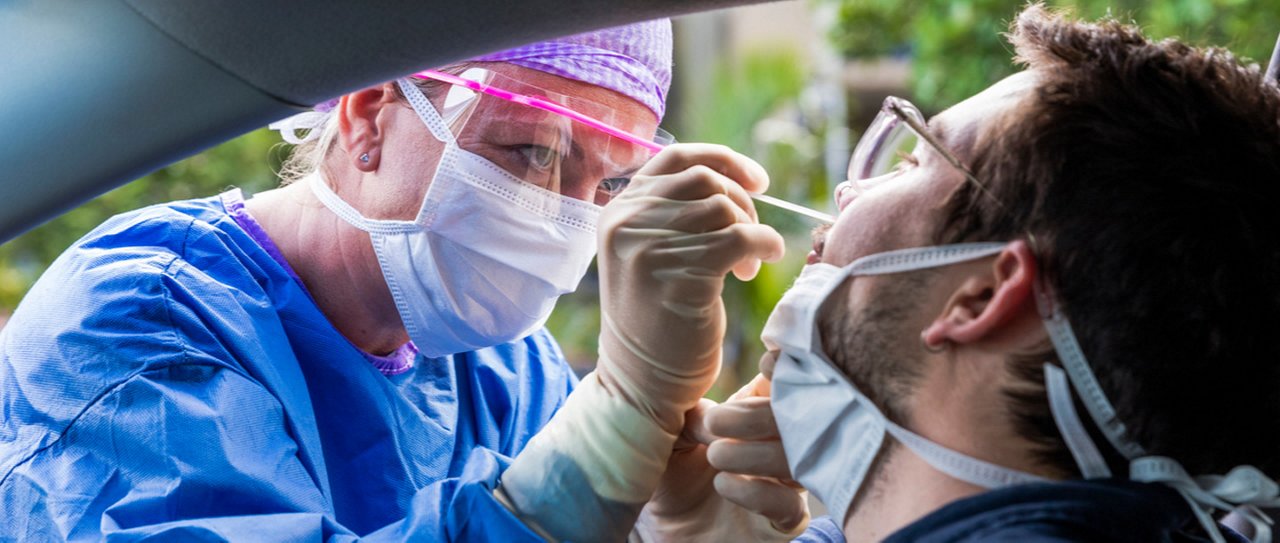What to do if you have symptoms of COVID-19

5 steps to take if you have COVID-19 symptoms
If you’re experiencing symptoms – such as trouble breathing, cough, fever or chills, sore throat, headache, body aches, nausea, vomiting, loss of taste or diarrhea – you should take the following steps.
1. Call your doctor
Your primary care physician is the first person you should contact if you think you have COVID-19. Of course, if you are in a true emergency, always call 911 first and request help. But in non-emergency cases, your regular doctor can screen you for the virus.
Screenings can typically be done via telehealth. So, ask your doctor for a phone or video visit. He or she will ask you questions about potential exposure, your symptoms and their severity. Your answers will help your doctor determine whether you should get tested.
You may be able to order a rapid test online or get tested at a drive-thru pharmacy.
Some people have an increased risk of becoming seriously ill and experiencing complications with COVID-19. The older you are, the greater that risk is. People with certain medical conditions are also at a higher risk. These include:
- Serious heart conditions
- Diabetes
- Cancer
- Kidney disease
- Liver disease
- Pulmonary issues
- Asthma
- High blood pressure
- Neurological conditions
- Sickle cell disease,
- And others.
People who are immunocompromised, obese or pregnant are also in greater danger for complications. If you have any of these increased risk factors, contact your health care provider as soon as COVID-19 symptoms arise.
2. Isolate at home
If you are sick, think you may be infected, have been exposed to someone with COVID-19 or are asymptomatic but have tested positive, isolating at home is the best way to avoid spreading the virus.
To quarantine at home, create a designated room and bathroom that only you will use, if possible. Avoid contact with other household members and pets, keeping at least six feet distance from them. Don’t share personal items (such as cups and towels). Wear a face covering over your mouth and nose. During isolation, the only time you should leave your home is for medical help.
3. Monitor your symptoms
It’s important to keep track of your illness. Being able to answer questions about your symptoms, their severity and the timeline of your illness will help your doctor determine the best course of action.
Most cases of COVID-19 are mild, and recovery can be done at home. However, if your symptoms continue to worsen and you have emergency warning signs such as trouble breathing, confusion, chest pain or pressure, a bluish hue in your face or lips, or are struggling to wake up or stay awake, you should seek immediate emergency medical care.
Be sure to call ahead and let your emergency facility know you’re coming. Let them know that you have – or suspect you have – COVID-19.
5. Clean and disinfect regularly
While COVID-19 is primarily transmitted through droplets and particulates in the air, it may also be spread through surfaces. That’s why it is especially important to clean any areas where a sick person has been.
What surfaces should be disinfected?
Even if you only think you have COVID-19, it’s important to clean high-touch areas frequently. Pay special attention to door knobs, handrails, cell phones, and countertops. Bathroom surfaces should be cleaned after each time the sick person uses the restroom, particularly if it is a shared bathroom.
What are some alternatives to disinfectants?
Disinfecting sprays and wipes have been hard to come by. If you haven’t been able to purchase your regular cleaning products, there are some simple and inexpensive alternatives that work just as well. Rubbing alcohol, hydrogen peroxide or a diluted bleach solution are all effective for disinfecting and sanitizing.
North Carolina Department of Health and Human Services (NC DHHS)
For general questions about COVID-19, call the North Carolina Coronavirus Helpline 866-462-3821.
You can also get answers to COVID-19 testing questions, or find a COVID-19 testing location.
Browse related articles

Blue Cross and Blue Shield of North Carolina does not discriminate on the basis of race, color, national origin, sex, age or disability in its health programs and activities. Learn more about our non-discrimination policy and no-cost services available to you.
Information in other languages: Español 中文 Tiếng Việt 한국어 Français العَرَبِيَّة Hmoob ру́сский Tagalog ગુજરાતી ភាសាខ្មែរ Deutsch हिन्दी ລາວ 日本語
© 2024 Blue Cross and Blue Shield of North Carolina. ®, SM Marks of the Blue Cross and Blue Shield Association, an association of independent Blue Cross and Blue Shield plans. All other marks and names are property of their respective owners. Blue Cross and Blue Shield of North Carolina is an independent licensee of the Blue Cross and Blue Shield Association.



